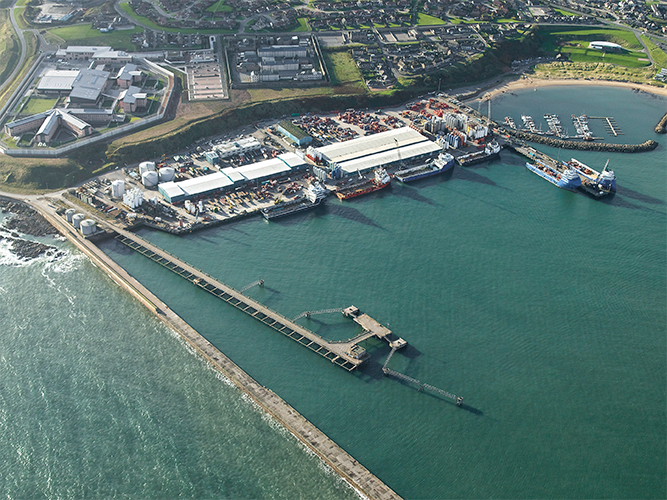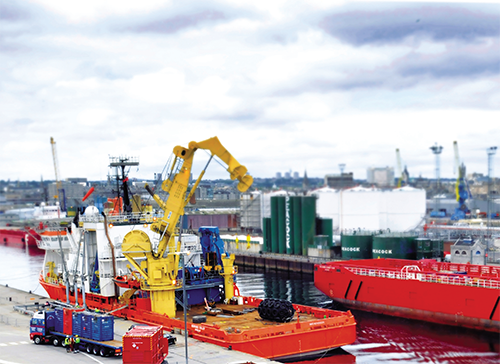
ASCO: Leading the Way in Global Energy Logistics Through Innovation and Partnership
Taking control
Today, 48 years after it was founded, ASCO has grown to serve a majority of leading clients in the global energy sector with world leading specialist logistics services. Starting off from humble beginnings as Aberdeen Service Company, the business has spread across the globe as a result of a robust and well-established reputation. “A lot of our expansion came from customers demanding new geographical coverage from us,” explains CEO Europe, Craig Lennox. “Then, once we had gained a foothold in these new locations we were able to sell to the local market, so it has been very much customerled internationalisation. In recent times, under the current ownership of Doughty Hanson, we have made some acquisitions in places like Australia to accelerate this growth.”
With an unrivalled service portfolio that encompasses everything from supply base management, offshore oilfield support and materials handling to fuel, environmental, personnel and technical services, ASCO currently delivers a vast offering. “In terms of scale, in a normal year we handle more than two million tonnes of oil and gas related materials, everything from deck terminals to bulk and fuel,” outlines Craig. “Beyond that we handle about half a million warehouse movements per year, which means that we are looking after in excess of a billion dollars worth of client inventory.”
Craig highlights that it is the company’s reputation that really gives it a competitive edge in the market: “It’s our dedication to making sure that our customer’s needs are met.” Yet, it is the vast range of services on offer, and its ability to deliver them that has earned ASCO this position. “There aren’t many companies that have got a transport arm of their business which involves logistics, vessel and marine planning, certification and assurance experience,” he continues. “So our market differentiation is pulling all these disparate bits together in a quick and effective manner to respond to last minute requests.” Only joining ASCO relatively recently after over 20 years in the offshore construction industry, Craig himself was impressed with the company’s ability to get over the challenges that normally severely impede rapid mobilisation in the industry. “We carry it all off without fuss,” he says. “It is testimony to the people and the processes in place, and to some degree the level of understanding of the challenges that are inherent in the supply chain. That knowledge is embodied in how our people work and this is why our customers have faith in us.”
Demonstrating this reputation, in 2015 alone ASCO has won a number of significant contracts from existing clients such as BP, Shell, OMV and Statoil. “It was very heartening to be brought in on Statoil’s development of the Mariner field,” notes Craig. “This was won off the back of being awarded another contract with them in Norway, which has always traditionally been handled by a competitor who have huge market dominance in that location, so this is a really positive feather in our cap over there.”
However, despite a high level of positivity currently pumping through ASCO’s veins, it is by no means ignorant of the challenges currently facing the UK offshore industry in both a long and short-term capacity. “There is no debate that the volumes of activity are forecast to be 20 per cent less in the second half of this year than in the first,” explains Craig. “A lot of this is coming from the exploration activities, which some of our services closely track, so we have had a drop in numbers in divisions that are associated with these operations and we don’t envisage these picking back up until Brent recovers to $70+ for a sustained period of time. Despite this we are relatively confident with volumes holding up in other areas with regards to supporting production services due to the demands of dayto- day activities in conjunction with essential maintenance and overhaul programmes.”
Perhaps more serious for the longer-term future of the UK’s offshore industry is the vast amount of cost and production inefficiencies inherent in the industry’s operations. “ASCO’s group CEO joined the company last year from outside the oil and gas industry and was surprised by some of the acceptable working practices and inherent inefficiencies that sit out there,” expresses Craig. “Between us we have been working very closely with a number of customers to look at what can be done to enable collaboration and bring about sustainable cost savings to the industry. Internally we are now running a programme called Project STRIDE and from this we are confident in seeing in excess of £100 million in annual savings in the North Sea alone by bringing in some changes in approach to how we deliver some of the materials to offshore facilities. With the timing of this amidst the state of lifting costs at the moment, there is recognition that it is important that the sector changes its cost bases.”
One particular example Craig outlines is the use of supply vessel utilisation, which currently tends to run at a level that would cause a road haulage firm to go out of business. Service vessels only operate 60 per cent of the potential and time and even then tend to be half empty, thus rendering them only 30 per cent operationally effective. “We’re trying to develop a practical approach that is more akin to taking routine, routed voyages as opposed to the more bespoke ‘taxi’ service that currently exists,” adds Craig.
This dedicated focus on working more as a partner to its customers, than simply a services provider, is all part of ASCO’s current efficiency awareness initiative. Accompanying it is a two million pound investment into developing robust solutions for markets all over the world. Part of this is in developing a bespoke integrated Logistic Management System (iLMS) to bring together vessel tracking communication systems, upgraded financial systems, and other information to give the customer improved visibility of their materials right the way through their supply chains. “This will also allow us to look at how best to conjoin these load lists and optimise delivery mechanisms,” adds Craig.
“From a strategic point of view, over the next three to five years we want to become the essential partner for oil and gas materials and equipment management,” he concludes. “There is a fundamental requirement in the industry for improved planning in order to create a far more efficient and sustainable economy in the industry. To overcome these challenges we have to work very closely with our customers who also have to be prepared to accept compromise in order to drive collaborative value through the market. The balance of risk and reward is only ever going to extend the economic life of the industries’ assets if mentality changes behind it. I have been in the industry for more than 20 years and it is quite clear that we really have to change if we’re going to make this a lasting solution, but I am confident that the economics can be successful if we work together.”
ASCO
Services@ World leading oilfield support service provider
Issue 1245 October 2015